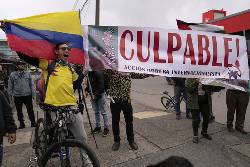BOGOTA, Colombia (AP) — Former Colombian President Álvaro Uribe was convicted of witness tampering and bribery charges on Monday in a historic trial that gripped the South American nation and threatened to tarnish the conservative strongman’s legacy.
The ruling was announced by a judge in Bogota, the country's capital, following a nearly six-month trial in which prosecutors presented evidence that Uribe attempted to influence witnesses who accused the law-and-order leader of having links to a paramilitary group founded by ranchers in the 1990s.
Uribe, 73, was not in court for the verdict as the judge has so far not ordered his arrest. He followed the ruling from his home outside Medellin but did not immediately make any comments about it.
Uribe faces up to 12 years in prison but a sentencing will be delivered in a separate hearing. He is expected to appeal the ruling.
The former president, who governed from 2002 to 2010 with strong support from the United States, is a polarizing figure in Colombia, where many credit him for saving the country from becoming a failed state, while others associate him with human rights violations and the rise of paramilitary groups in the 1990s.
While the ruling was read, Uribe's opponents clashed briefly with his supporters outside the courthouse.
In a lengthy ruling that lasted more than 10 hours, Judge Sandra Heredia said there was enough evidence to determine that Uribe conspired with a lawyer to coax three former members of paramilitary groups who were in prison into changing testimony they had provided to Ivan Cepeda, a left-wing senator who had launched a probe into Uribe’s alleged ties to a paramilitary group.
The case dates back to 2012, when Uribe filed a libel suit against Cepeda with the Supreme Court. But in a surprise twist, the high court dismissed the charges against Cepeda and launched an investigation against Uribe in 2018.
During Uribe's presidency, Colombia’s military attained some of its biggest battlefield victories against Latin America’s oldest leftist insurgency, pushing the Revolutionary Armed Forces of Colombia into remote pockets and forcing the group’s leadership into peace talks that led to the disarmament of more than 13,000 fighters in 2016.
Known for his tireless work ethic and short temper, Uribe still has legions of followers in Colombia and is one of the fiercest opponents of the current president, former leftist guerrilla Gustavo Petro.
U.S. Secretary of State Marco Rubio reacted to the ruling, as it became evident that Judge Heredia was going to find the former president guilty of bribery.
“Uribe’s only crime has been to tirelessly fight and defend his homeland” Rubio wrote on Monday on X. “The weaponization of Colombia’s judicial branch by radical judges has now set a worrisome precedent.”
Colombian President Gustavo Petro defended the ruling, writing on X that “a strong justice system” will enable Colombia to emerge from violence.
Heredia said that her ruling should not be interpreted as “a victory for anyone” but as “an act of justice.”
Critics also blame Uribe for state crimes. According to a truth commission created in 2017, more than 6,400 civilians were executed by the Colombian military and identified as members of rebel groups by soldiers seeking promotions during the conflict, in a phenomenon that peaked during the Uribe administration.
Prosecutors accused Uribe of sending lawyers to meet with imprisoned former paramilitary henchmen and pressure them to drop testimony that they had provided to Senator Cepeda.
During the trial, Uribe denied trying to flip witnesses but acknowledged seeking interviews with the men as part of his preparation for trial and to verify testimonies that were also being used in a murder trial against his brother, Santiago Uribe, who was also accused of ties to the armed paramilitaries.
___
Follow AP’s coverage of Latin America and the Caribbean at https://apnews.com/hub/latin-america
...


 Copyright © 1996 - 2025 CoreComm Internet Services, Inc. All Rights Reserved. | View our
Copyright © 1996 - 2025 CoreComm Internet Services, Inc. All Rights Reserved. | View our